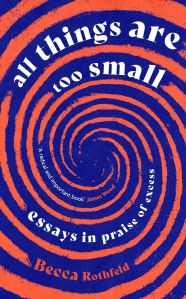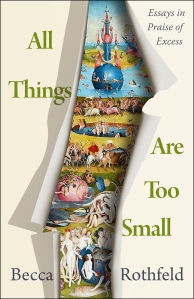A cancer story that treads the line between biography and fiction, and a set of high-brow essays about popular culture and modern life.
Cheri by Jo Ann Beard (2023)
{SPOILERS IN THIS ONE}
Claire Keegan helped popularize the trend of publishing stand-alone stories as small hardback volumes. It was my first time reading Beard, and her style does in fact remind me of Keegan, along with Denis Johnson and Ann Patchett. This originally appeared in the literary magazine Tin House in 2002. It is the life story of Cheri Tremble, a real woman who was born in 1950 and died in 1997 via an illegal assisted suicide conducted by Dr. Jack Kevorkian. I’d heard a lot about Cheri, but his name was never mentioned – to avoid spoilers, of course, yet it’s key.
 Cheri is an Amtrak ticket-taker who’s diagnosed with breast cancer in her mid-forties. After routine reconstructive surgery goes wrong and she’s left disabled, she returns to the Midwest and buys a home in Iowa. Here she’s supported by her best friends Linda and Wayne, and visited by her daughters Sarah and Katy. “Others have lived. She won’t be one of them. She feels it in her bones, quite literally.” When she hears the cancer has metastasized, she refuses treatment and starts making alternative plans. She’s philosophical about it; “Forty-six years is a long time if you look at it a certain way. Ursa is her seventh dog.”
Cheri is an Amtrak ticket-taker who’s diagnosed with breast cancer in her mid-forties. After routine reconstructive surgery goes wrong and she’s left disabled, she returns to the Midwest and buys a home in Iowa. Here she’s supported by her best friends Linda and Wayne, and visited by her daughters Sarah and Katy. “Others have lived. She won’t be one of them. She feels it in her bones, quite literally.” When she hears the cancer has metastasized, she refuses treatment and starts making alternative plans. She’s philosophical about it; “Forty-six years is a long time if you look at it a certain way. Ursa is her seventh dog.”
Beard recounts all of this matter-of-factly (“the diminished lung capacity, the clangorous pain”), drawing on what is known of Cheri Tremble’s life and only adding her own stamp by making up memories that fuel flashbacks as Cheri drifts through pain-filled half-waking. One of these, of falling through the ice on a frozen pond as a child, appears early in the book and recurs at her moment of death. Beard also contrasts onlookers’ compassion or lack thereof.
It’s a potent portrait of everyday suffering and heroism and, in its way, an argument for assisted dying, which mustn’t be cloaked in secrecy as it was for Cheri – “They leave under cover of darkness, like duck hunters or criminals” to meet ‘Dr. Death’ in another state. I finished the story feeling underwhelmed; maybe I’ve simply read too much around the topic, but I couldn’t see how granting the subject interiority (which is what fiction is all about, yes, though the best biographies can do it, too) was enough to set it apart. (New purchase with birthday voucher, Hungerford Bookshop)
All Things Are Too Small: Essays in Praise of Excess by Becca Rothfeld (2024)
 Rothfeld, the Washington Post’s nonfiction book reviewer, is on hiatus from a philosophy PhD at Harvard. Her academic background is clear from her vocabulary. The more accessible essays tend to be ones that were previously published in periodicals. Although the topics range widely – decluttering, true crime, consent, binge eating, online stalking – she’s assembled them under a dichotomy of parsimony versus indulgence. And you know from the title that she errs on the side of the latter. Luxuriate in lust, wallow in words, stick two fingers up to minimalism and mindfulness and be your own messy self. You might boil the message down to: Love what you love, because that’s what makes you an individual. And happy individuals – well, ideally, in an equal society that gives everyone the same access to self-fulfillment and art – make for a thriving culture. That, with some Barthes and Kant quotes.
Rothfeld, the Washington Post’s nonfiction book reviewer, is on hiatus from a philosophy PhD at Harvard. Her academic background is clear from her vocabulary. The more accessible essays tend to be ones that were previously published in periodicals. Although the topics range widely – decluttering, true crime, consent, binge eating, online stalking – she’s assembled them under a dichotomy of parsimony versus indulgence. And you know from the title that she errs on the side of the latter. Luxuriate in lust, wallow in words, stick two fingers up to minimalism and mindfulness and be your own messy self. You might boil the message down to: Love what you love, because that’s what makes you an individual. And happy individuals – well, ideally, in an equal society that gives everyone the same access to self-fulfillment and art – make for a thriving culture. That, with some Barthes and Kant quotes.
The writing has verve, from the alliterative word choice to the forcefulness of Rothfeld’s opinions. But in places her points of reference (from classic cinema, especially) are so obscure that I had no way in and the pieces felt like they would never end. My two favourites were “More Is More,” in which she’s as down on fragmentary autofiction (Jenny Offill et al.) as she is on Marie Kondo; and “Normal Novels,” about how she finds Sally Rooney’s self-deprecation and communism problematic. I knew the subject matter well enough to follow the arguments here, even if I ultimately disagreed with them.

The U.S. cover featuring a Bosch painting is so much better!
Rothfeld is worth reading as a cultural critic, at least in small doses. She is clearly not interested in being a personal essayist, however, as the intimacy she keeps discussing in theory is almost completely absent. A piece on mental health, “Wherever You Go, You Could Leave,” opens with one tantalizing autobiographical line – “My first year of college, I attempted suicide and was promptly hastened home by an ominously smiling administrator” – then proceeds to poke fun at meditation for most of its 40 pages. It was interesting to see her fan-girl over her favourite novel, which I would even try if it wasn’t 480 pages: “I want to be reading Mating [by Norman Rush] constantly; I want to have been reading Mating forever, but always for the first time; I want everything in my life to be Mating and nothing but Mating”. Keep an eye out for the sequel: Actually, Moderation Is Cool: How I Learned to Temper My Expectations.
With thanks to Virago Press for the free copy for review.
Must be weird for Tremble’s kids, knowing their mother has this semi-fictional afterlife in literature that is and isn’t about her. I found the invention of the falling-through-ice anecdote a bit off-putting; people *do* have those inexplicable, recurring childhood memories, but there’s something odd about making one up, and for it to be such an obvious symbolic kind of memory.
LikeLiked by 1 person
Good point. Beard interviewed her family and friends, so they must have been on board, but I wonder if the finished product is what they expected and if they recognize her on the page.
LikeLike
Such an interesting project to undertake, and, from a family perspective, a complex thing to be willing to greenlight. I wonder if they were all on board to the same extent.
LikeLiked by 1 person
I am reading All Things are Too Small right now, and man the meditation essay irked me!! She has to know that no one, other than literal monks, meditates all the time, and that having a meditation practice doesn’t mean you never think or judge. It’s just silly. Most regular people who meditate are doing so for like 10-30 minutes a day, and that’s being generous. I’m halfway through the essay on consent and liking that a lot better. I mostly love her style, including the alliteration, but once in a while there’s a terribly clunky sentence, or the vocabulary just get SO over the top.
LikeLiked by 2 people
I’m so glad someone else I know is reading it! (And recognizes my sources of annoyance.)
LikeLike
Oh god this sounds really annoying. It’s not like making fun of meditation makes you in any way edgy.
Cheri sounds interesting, despite its limitations. I am very on board with measuring your life through dogs. I’m often a little sad that I was only able to get Maddy when I was 34 and so I’ll fit fewer dogs of my own in. Maybe the only solution is to have more than one at a time 😉
LikeLiked by 1 person
Reminds me of the Mad Men quote (I think it was Peggy’s mother): “You’re lonely? Get a cat. They live 13 years, then you get another one, and another one after that. Then you’re done.” A rather sad and cynical way to think about it!
I like the idea I came across in Sandwich of getting an “overlap” pet so you’ll never have a time without one.
LikeLike
Ha, what a fabulous quote about the Norman Rush novel (one that I only have in epub, which means I’ll likely never read it). Also, what a curious choice: to open the essay with a single personal statement, so revealing, then to continue with a more investigative style.
LikeLiked by 1 person
I thought the university library might have the Rush, but alas no. Had her favourite novel been 200 pages, I would for sure have found a way to read it 😉
LikeLike
I was tempted to read the Rothfeld for a while but always hesitated. I think it’s enough for me now, having read your great review, to let it go, perhaps catching her essays in publications, outside her books. As you write here, she’s worth reading but in small doses.
LikeLiked by 1 person
Thanks! Yes, my feeling was that I’d read her criticism as I come across it on the Internet, bur probably not in long form again.
LikeLiked by 1 person